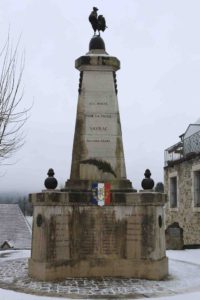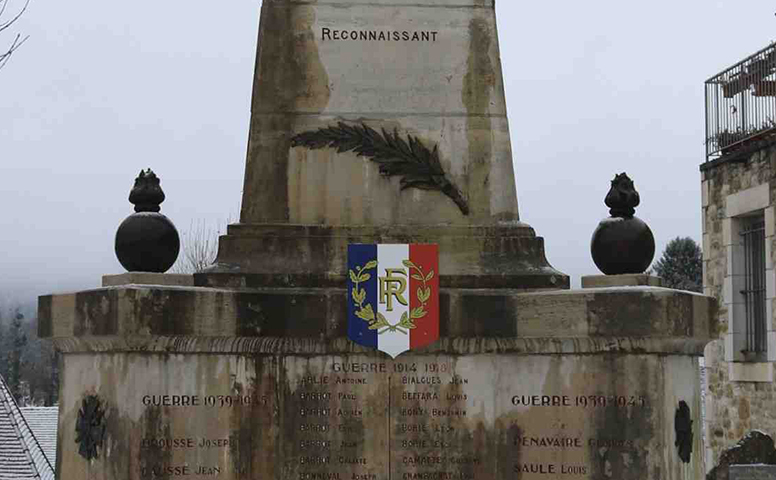15 February 2018
“Ah yes, you took part too.”
France and WW2
by Richard Pooley
 The showing in the past few months of Dunkirk, Churchill and Darkest Hour by the cinema in our French village – Vayrac – has given me the opportunity to find out more about how the French view the UK’s role in the Second World War; and, by extension, their own. I say “more” because from the beginning of our life here over four years ago hardly a month has passed without us discovering just how different is the French view of British behaviour and actions before, during and after WW2 to that held by us British.
The showing in the past few months of Dunkirk, Churchill and Darkest Hour by the cinema in our French village – Vayrac – has given me the opportunity to find out more about how the French view the UK’s role in the Second World War; and, by extension, their own. I say “more” because from the beginning of our life here over four years ago hardly a month has passed without us discovering just how different is the French view of British behaviour and actions before, during and after WW2 to that held by us British.
Sometimes it can be just a comment which brings us up short. My wife and I have never forgotten the first time we both attended the Vayracois’ celebration of Victory in Europe Day at the war memorial. It was 8 May 2014. I had been abroad on business for the previous year’s Remembrance Day on 11 November. But my wife had gone and reported that it had been a moving occasion, entirely focused on honouring the eighty-six men from the village who never returned from the battlefields of the First World War. But what would our new neighbours want to remember from WW2? The rapid and humiliating defeat of the French army in 1940? The brutal occupation initially of northern and western France and then the whole country by the Nazis? The incompetent and increasingly onerous rule of the Vichy puppet government over central, southern and eastern France (including Vayrac) until1943? The French Resistance, even though relatively few French actively opposed their German or Vichy masters?
It was the latter, of course. There are nine names listed on Vayrac’s war memorial under Guerre 1939-1945. It’s unusual to have so many, even in this part of south-west France where the Resistance was arguably the strongest. So, it was not surprising that our mayor devoted almost all of his speech in May 2014 to recalling the courage and sacrifice of the Resistance fighters. After all he and we can buy our bread each day from the grandson of one of those nine men. There was just one sentence reminding his listeners that others had come to the aid of France – the Russians, the Americans and the British. In that order. The mayor then pinned a medal on one ancien combattant to go with the others the old fighter was already wearing. After the ceremony we were all invited to have a drink at the mairie. A middle-aged woman came up to us and asked if we would like to pay for a bleuet de France, the blue cornflower which, like the poppy, was one of the few flowers that continued to grow in the smashed-up land between the WW1 trenches. The bleuet is worn on 8 May as well as 11 November. When the woman realised we were English, she cocked her head to one side and after a moment’s hesitation said: “L’Angleterre? Ah oui, vous avez participé aussi.” She was referring to WW2.
On 8 May 2015, the 70th anniversary of Germany’s surrender, the mayor gave a shorter speech, first about the Resistance and then about the debt France owed to the Russians for the defeat of Hitler and the Nazis. A passing reference to the American contribution. No mention of the British. Our mayor, I should point out, was elected on the right-wing Republican ticket. Perhaps that is why he talked of Russia and not the Soviet Union. His speech was preceded by the Marseillaise and a rendition of the Chant des Partisans, the song written and performed by Anna Marly in London in 1943, broadcast by the BBC and immediately taken up by the maquisards. Marly’s voice is jaunty but low-key, though her lyrics are as violent as those of the Marseillaise. Sung by the children of Vayrac’s church choir the song became soft and plaintive. Here is one verse:
Hey you, assassins, with your bullets and your knives, kill tonight!
Hey you, saboteurs, be careful with your burden, dynamite!
It’s not the same as La Complainte du Partisan, also by Marly, which was covered by Leonard Cohen as The Partisan. For a while after WW2 there was a campaign to make the Chant des Partisans the national anthem instead of the Marseillaise.
So, how do the French see the UK’s role and behaviour in WW2? Not very positively is the short answer. And our contribution to the final victory was small in comparison to that of the Americans and, above all, the Russians. As one French business friend told me on one of our lunches together in Paris late last year when I asked him if he had seen Dunkirk: “No, I will not see it. I know what happened. Your army escaped but that is because we protected them. You left us behind. But the movie will not show that, I am sure.” He went on to tell me about his father who had been captured by the Germans outside Dunkirk. “He was at the top of a church tower. How do you say? Watching for Germans? So, he could signal to the French soldiers. They were stopping the Germans arriving to the beaches. The Germans came up the tower. His officer was killed but he was made a prisoner. But he was glad to be prisoner of war. His brothers had to work in factories in Germany. That was bad.”
One of my French rugby mates, old enough to have fought in the Algerian War of Independence in the late 1950s, once told me that his father had always hated the British for firing on the French fleet lying at anchor at Mers-el-Kébir in July 1940, knocking out seven ships and killing 1,297 French sailors in the process. That war in Algeria, by the way, was sparked by a march demanding independence which turned into the massacre of over one hundred French settlers. It took place on 8 May, 1945.
The cinema – capacity 200 – was quarter-full for the Version Original showings (English with French subtitles) of Dunkirk and Churchill. And most of those were British and Dutch expats. I gather there were more French people present at the screenings dubbed in French. The cinema was almost full for both showings of Darkest Hour. I am sure this was not just because of the superb acting skills of Gary Oldman and, indeed, the whole cast, including Paris-based Kristin Scott Thomas, who is hugely popular in France. The French are sneered at in Dunkirk (my Paris friend was right). In Darkest Hour Churchill’s love of France and the French, well-known here but not perhaps in the UK comes through strongly. My French teacher, Jewish, born during the war to parents from northern France given shelter by the mayor of a village in the Dordogne department, is one of the committee of three who decide which twenty-one films will be shown each month. She loved Darkest Hour. Why? Because it told the truth as she was taught it: Churchill was among a minority of British people who cared what happened to France. Little wonder that so many squares and streets in France are named after the great man.
We shall be at Vayrac’s war memorial once again on 8 May this year. Perhaps this time our mayor will give greater prominence to the role the British played in supporting the local Resistance (and in trying with limited success to get the Communist and Gaullist groups to work together – the subject of a future article, dear reader). But I doubt it. More likely he will have been reminded by those films to praise Churchill. But not la perfide Albion.


